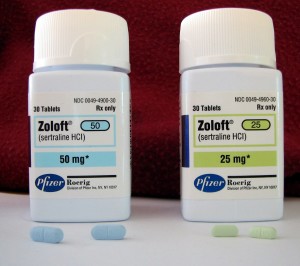FDA Asks Pfizer to Change Zoloft Warnings
 The U.S. Food and Drug Administration (FDA) has asked Pfizer, Inc. to change the safety warnings on its Zoloft packaging. If Pfizer complies, the label change will be Pfizer’s first acknowledgement that a woman’s prenatal use of the antidepressant may cause heart defects in newborns.
The U.S. Food and Drug Administration (FDA) has asked Pfizer, Inc. to change the safety warnings on its Zoloft packaging. If Pfizer complies, the label change will be Pfizer’s first acknowledgement that a woman’s prenatal use of the antidepressant may cause heart defects in newborns.
The FDA made the request in August, based on a research study showing that when mothers took the antidepressant during pregnancy, their babies faced an increased risk of congenital heart defects. Pfizer, however, disputes the conclusiveness of any studies finding a causal connection with neonatal heart defects. According to Pfizer’s representatives, there is no reliable evidence that Zoloft causes heart defects and the company has warned doctors and patients about any risks.
Zoloft use in pregnancy linked to heart defects
Pfizer’s Zoloft is a selective serotonin reuptake inhibitor (SSRI) that has been widely prescribed across the country to treat depression. More than 15 years ago, the FDA approved Zoloft to treat depression in adults; however, it has never approved the drug to treat pregnant women. Women suing Zoloft now allege that despite lack of approval, Pfizer specifically marketed the drug as safe for use in pregnancy.
Pfizer is the target of hundreds of federal and state lawsuits alleging that use of the drug during pregnancy caused serious birth defects. More than 500 lawsuits have been consolidated in a multidistrict litigation in Pennsylvania.
The lawsuits allege a variety of defects allegedly caused by prenatal use of Zoloft, including septal defects in which the child is born with holes in the heart. Earlier this year, Pfizer won jury trials in two state courts. The first federal Zoloft lawsuit is scheduled to begin trial in January.
Black box warning may affect litigation
According to Carl Tobias, a products liability law professor from the University of Richmond, the label change could both help current Zoloft plaintiffs and prevent future lawsuits. It would act as an admission by the drug manufacturer that prenatal use of Zoloft can lead to newborn heart defects. But providing an adequate warning on the box prevents future users from claiming that they were unaware of the risk. Pfizer representatives, however, still maintain that there has not been a showing of a causal relationship between the drug and newborn heart defects.
In 2005, Zoloft was the market-leading antidepressant with $3.3 billion in sales. In 2006, Pfizer’s patent expired and other manufacturers were then allowed to sell generic versions. If the heart defects warning is added to the Zoloft packaging, then the manufacturers of the generics will also need to include the box warning.
The recent request that Pfizer update its Zoloft label is not the first involvement the FDA has had with Zoloft. In 2011, the agency warned that taking an SSRI like Zoloft during pregnancy can lead to a dangerous heart and lung condition known as persistent pulmonary hypertension of the newborn (PPHN). Research has shown that newborns with PPHN were six times more likely to be born to mothers who took an SSRI after week 20 of pregnancy.
- Bloomberg Business, Pfizer Weighing FDA Request to Change Zoloft’s Warnings, http://www.bloomberg.com/news/articles/2015-09-17/pfizer-weighing-fda-request-to-change-zoloft-s-warnings
- U.S. Food & Drug Administration, FDA Drug Safety Communication: Selective serotonin reuptake inhibitor (SSRI) antidepressant use during pregnancy and reports of a rare heart and lung condition in newborn babies, http://www.fda.gov/Drugs/DrugSafety/ucm283375.htm

 Resources
Resources
 Resources
Resources
